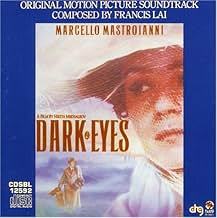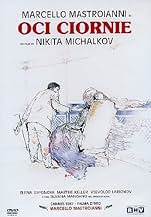AVALIAÇÃO DA IMDb
7,3/10
3,7 mil
SUA AVALIAÇÃO
Adicionar um enredo no seu idiomaAn Italian tells his story of love to a Russian. In a series of flashbacks, Romano Patroni leaves his wife to visit a spa where he falls in love with a Russian woman. He returns to Italy res... Ler tudoAn Italian tells his story of love to a Russian. In a series of flashbacks, Romano Patroni leaves his wife to visit a spa where he falls in love with a Russian woman. He returns to Italy resolved to leave his wife and marry his love.An Italian tells his story of love to a Russian. In a series of flashbacks, Romano Patroni leaves his wife to visit a spa where he falls in love with a Russian woman. He returns to Italy resolved to leave his wife and marry his love.
- Direção
- Roteiristas
- Artistas
- Indicado a 1 Oscar
- 12 vitórias e 22 indicações no total
Elena Safonova
- Anna Sergeyevna, Governor's Wife
- (as Elena Sofonova)
Innokentiy Smoktunovskiy
- Il Governarore di Sisoev
- (as Innochentij Smoktunovskj)
Yuriy Bogatyryov
- Il Maresciallo
- (as Jury Bogatiriov)
Dmitriy Zolotukhin
- Konstantin
- (as Dimitri Zolothuchin)
Jean-Pierre Bardos
- Ospite sdraiato
- (as J. Pierre Bardos)
Elguja Burduli
- Il cuoco della nave
- (as Elgugia Burduli)
Pierluigi Cervetti
- Il maestro di ginnastica
- (as P. Luigi Cervetti)
Avaliações em destaque
There are many wondrous qualities to this movie, especially the performance of Marcello Mastroianni. I only want to mention one scene, my favorite. It occurs when Romano (Mastroianni) arrives by train in the Russian village of Sisoev where he is to set up a glass factory.
Upon de-training all he sees is a peasant woman with a cow. Suddenly, on the other side of the tracks a band plays. Romano walks across the welcome-carpet to a crowd of townspeople giving him a raucous reception. Actually folks here want the factory for themselves . The Italian is offered Russian bread to sample. Young girls bear doves and present the man with wreaths. The mayor recites a poem and gives a welcome speech. A medal is bestowed. Kisses galore are planted.
Singers and balalaika players appear. Caviar and lethal vodka is thrust upon the man, who is barely able to cope with its potency. It's a distillation (pun intended) of Russian-ness which overwhelms the guest as he is conducted by carriage to his hotel and carried in, tired and soused, later muttering "Sabatchka," the name of the little dog belonging to Anna, the Russian girl that has aroused his passion. Great, great!
Upon de-training all he sees is a peasant woman with a cow. Suddenly, on the other side of the tracks a band plays. Romano walks across the welcome-carpet to a crowd of townspeople giving him a raucous reception. Actually folks here want the factory for themselves . The Italian is offered Russian bread to sample. Young girls bear doves and present the man with wreaths. The mayor recites a poem and gives a welcome speech. A medal is bestowed. Kisses galore are planted.
Singers and balalaika players appear. Caviar and lethal vodka is thrust upon the man, who is barely able to cope with its potency. It's a distillation (pun intended) of Russian-ness which overwhelms the guest as he is conducted by carriage to his hotel and carried in, tired and soused, later muttering "Sabatchka," the name of the little dog belonging to Anna, the Russian girl that has aroused his passion. Great, great!
Yes, its story is an old chestnut. There's an excuse for Marcello Mastroianni to tell a story about himself and a Russian woman, and he does it, and there's an aftermath. But the story is so good and so well told (and acted and directed) that the device is like an old friend. This is one of Mikhailkov's best, right up there with Burnt by the Sun. It draws on Heifetz's Lady with a Dog (and Chekhov's short story too, for that matter) and parodies (or pays homage to) Fellini's 8 1/2--both just right for this Italo-Russian piece about Italians and Russians, which I found a pure delight. It revels in both poking fun of and warmly enjoying both Italian and Russian types and moods. For me, there was the additional pleasure of seeing Innokenti Smoktunovsky, who played the title role in Kozintsev's Hamlet, now middle-aged and as fine an actor as ever. Will it ever be released on DVD? It's about time this one is rediscovered.
10adipocea
There's no really much you can say and analyze about this movie. It's not a movie by itself, it's a piece of art lost in the ocean of mundane cinema of the 20-th century. It's like the great literature, the great paintings of history, impregnated with a mystical and hard to define quality in it's texture. For me this is not simply a "movie", i say it again. Like Nostalghia or Andrei Rubliov of Tarkovsky , here the poetics transcends what we usually call cinema, or a film, because it gets a life on it's own, and becomes independent to critical observation. It's like a tiger in the Siberian forest, that you have to simply admire. A tiger is beautiful because it's a tiger, Oci Ciornie it's beautiful because it is Oci Ciornie. Something divine happened to Mihalkov and to the cast when thy made this piece of art. It was the greatest shame and scandal when the jury at Cannes awarded "Sous le Ciel de Satan" the Palme D'or, but who cares...Time is for the art what is for the wine. The good one gets better, the cheap one gets sour and becomes vinegar.
for its wise simplicity. for its touching beauty. and for the high Mkhalkov precision to create the details. a film with an impressive cast - Mastroianni is the first violin but not the one - and example of inspired manner to use the Tchekov spirit and the glamor of a century beginning. a film like a puzzle in which each image, performance or scene is charming like a kind of gem, delicate and illustration of art of a master. a special meeting between art of few great actors and an unique director. and the flavor of a Russia who becomes different in contact with Mastroianni - it is not the only meeting , Sunflower is another , but in this case, far by war or Sophia Loren, the story seems be a precious drink in a crystal glass.for me, one of films who, after its end, proofs than it represents one of movies who you search for without know than it exists.
I consider this movie a masterpiece. The performance of Marcello Mastroianni is simply sublime, one of the best I have ever seen from anyone, anywhere. Yes, the surface plot is about adultery, but the story is much more than that. I think this is a story about a man, an old man near the end of his life, looking back on his playboy, vagabond, good-for-nothing life, regretting it, but not knowing any other way to live. "Mother's lullaby and the Russian mist" is all he remembers about his own life, he says. Watch this old man cry, and it stirs you with all kinds of emotions and thoughts, makes you think about how you should live, that tragedy happens everyday, to every small man who must fend for himself and fail. You tell yourself you will never be like him, you pity him, disrespect him, despise him, but in the end you understand this man in the most profound sense. And you will never be able to forget that Russian mist either. Superb.
Você sabia?
- CuriosidadesFinal film of Silvana Mangano.
- Trilhas sonorasSonata per pianoforte n. 17 in Si bemolle maggiore, K. 570
Composed by Wolfgang Amadeus Mozart
Performed by Laurent Ferlet
Principais escolhas
Faça login para avaliar e ver a lista de recomendações personalizadas
- How long is Dark Eyes?Fornecido pela Alexa
Detalhes
- Data de lançamento
- Países de origem
- Idiomas
- Também conhecido como
- Dark Eyes
- Locações de filme
- Montecatini Terme, Pistoia, Tuscany, Itália(health spa)
- Empresas de produção
- Consulte mais créditos da empresa na IMDbPro
Bilheteria
- Faturamento bruto nos EUA e Canadá
- US$ 2.201.428
- Faturamento bruto mundial
- US$ 2.201.428
- Tempo de duração
- 1 h 58 min(118 min)
- Cor
- Mixagem de som
- Proporção
- 1.85 : 1
Contribua para esta página
Sugerir uma alteração ou adicionar conteúdo ausente



































